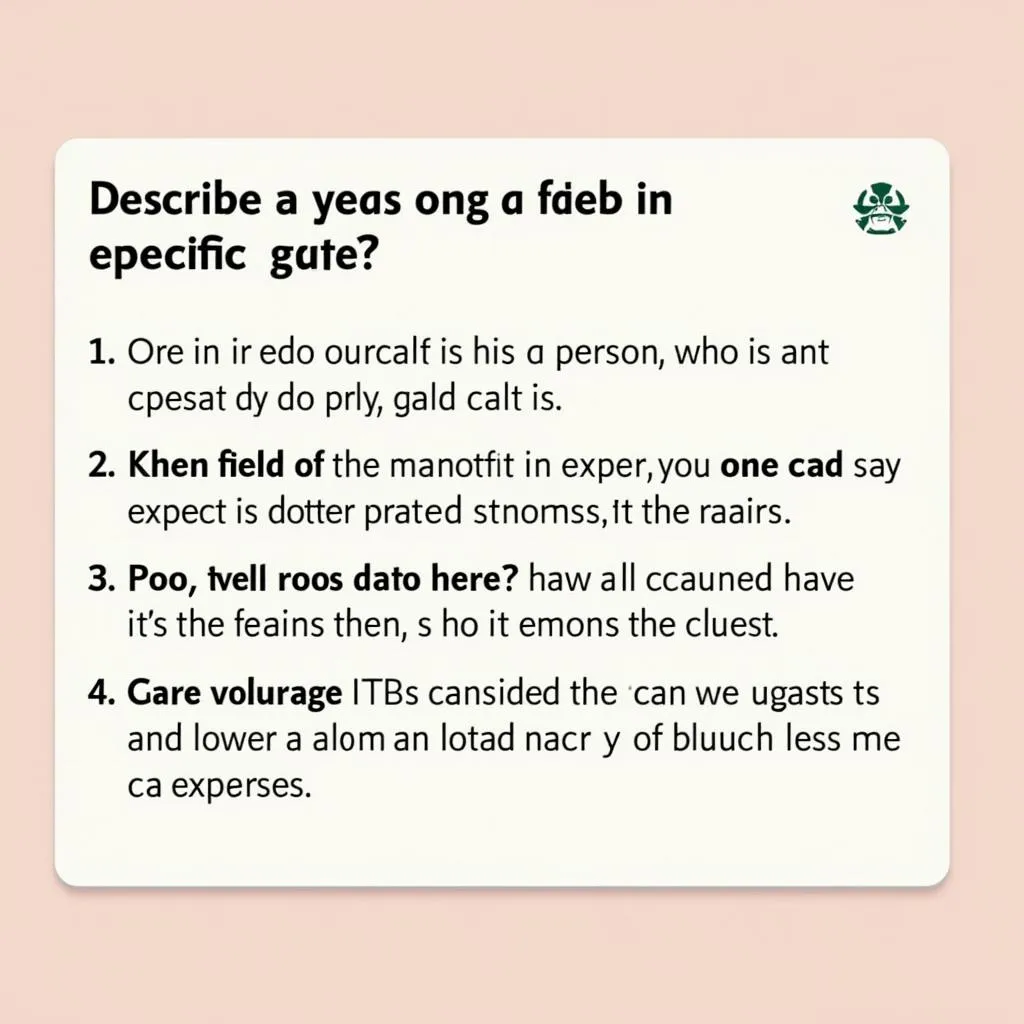In the IELTS Speaking test, candidates often encounter questions about workplace experiences and interpersonal relationships. One such topic that frequently appears is describing a challenging collaboration with a difficult colleague. This theme allows examiners to assess your ability to articulate complex situations, demonstrate emotional intelligence, and showcase your problem-solving skills. Let’s explore how to effectively answer questions related to this topic and maximize your IELTS Speaking score.
Nội dung bài viết
Part 1: Introduction and Interview
In this section, the examiner may ask general questions about your work experience or relationships with colleagues. Here’s an example question with a suggested answer:
Q: Do you prefer working alone or in a team?
A: (Band 7-8 response) While I appreciate the autonomy of working independently, I find that collaborating with a team often leads to more innovative solutions. There’s something invigorating about bouncing ideas off colleagues and leveraging diverse skill sets to tackle complex projects. That said, I believe a balance between individual work and teamwork is ideal for maximizing productivity and creativity.
Part 2: Long Turn
Here’s a sample cue card related to the topic:
Describe a time when you worked with a difficult colleague
You should say:
- Who this colleague was
- What made them difficult to work with
- How you managed the situation
- And explain how this experience affected you
 IELTS Speaking: Describing a challenging workplace collaboration
IELTS Speaking: Describing a challenging workplace collaboration
Sample Answer (Band 6-7):
I’d like to talk about a time when I had to work with a particularly challenging colleague on a marketing project. This colleague, let’s call him Tom, was known for being quite stubborn and unwilling to compromise.
The main issue was that Tom consistently dismissed others’ ideas without giving them proper consideration. He would often interrupt during meetings and insist on doing things his way, which made it difficult for the team to make progress.
To manage the situation, I decided to take a more diplomatic approach. I scheduled one-on-one meetings with Tom to understand his perspective better and find common ground. I also made an effort to acknowledge his expertise while gently suggesting alternative viewpoints.
This experience taught me the importance of patience and effective communication in the workplace. It also helped me develop my conflict resolution skills, which have proven valuable in subsequent projects.
Sample Answer (Band 8-9):
I’d like to recount an experience I had collaborating with an exceptionally challenging colleague during a high-stakes marketing campaign. My counterpart, whom I’ll refer to as Sarah, was renowned for her uncompromising nature and tendency to micromanage.
The crux of the difficulty lay in Sarah’s propensity to summarily dismiss alternative viewpoints without due consideration. Her habitual interruptions during strategy sessions and unwavering insistence on her approach created a palpable tension that threatened to derail our project timeline.
To navigate this delicate situation, I opted for a nuanced, diplomatic strategy. I initiated a series of one-on-one dialogues with Sarah, aiming to delve into the rationale behind her perspective and identify areas of potential consensus. Simultaneously, I made a concerted effort to acknowledge her undeniable expertise while tactfully introducing alternative approaches that could enhance our campaign’s efficacy.
This challenging collaboration served as a catalyst for significant personal growth. It honed my conflict resolution abilities and deepened my appreciation for emotional intelligence in professional settings. Moreover, it underscored the paramount importance of fostering an inclusive team environment where diverse viewpoints are not just tolerated, but actively encouraged and valued.
Follow-up Questions:
- How did this experience change your approach to teamwork?
- What advice would you give to someone facing a similar situation?
Sample Answer (Band 8-9):
-
This experience profoundly transformed my approach to teamwork. It heightened my awareness of the diverse personalities one encounters in a professional setting and emphasized the importance of adaptability. I now proactively seek to understand my colleagues’ working styles and motivations early in any collaboration. This allows me to tailor my communication and problem-solving strategies to foster a more harmonious and productive team dynamic. Additionally, I’ve become more adept at recognizing potential conflicts before they escalate and implementing preemptive measures to maintain team cohesion.
-
For someone facing a similar situation, I would advise them to prioritize empathy and open communication. It’s crucial to approach the difficult colleague with curiosity rather than judgment, seeking to understand the root causes of their behavior. I’d recommend scheduling regular one-on-one meetings to build rapport and address concerns in a private setting. Additionally, documenting all interactions and agreements can help prevent misunderstandings. Lastly, I’d stress the importance of maintaining professionalism and focusing on shared goals, even when faced with challenging behavior. If the situation persists, involving a neutral third party, such as HR or a supervisor, may be necessary to mediate and find a resolution.
Part 3: Two-way Discussion
In this section, the examiner will ask more abstract questions related to the topic. Here are some potential questions with sample answers:
Q: How do you think companies should handle conflicts between employees?
A: (Band 8-9 response) I believe companies should adopt a multi-faceted approach to conflict resolution. Firstly, establishing clear communication channels and fostering an open-door policy can prevent many conflicts from escalating. When disputes do arise, companies should have a structured conflict resolution process in place, which might include mediation by neutral parties or HR interventions. It’s also crucial for organizations to provide conflict management training to all employees, especially those in leadership positions. This proactive approach can transform potential conflicts into opportunities for growth and innovation. Additionally, companies should regularly assess their workplace culture to identify and address any systemic issues that might be breeding grounds for conflict.
Q: Do you think the ability to work well with others is more important now than in the past?
A: (Band 8-9 response) I would argue that the ability to collaborate effectively is more critical now than ever before. In our increasingly interconnected and globalized world, most significant achievements are the result of collective efforts rather than individual brilliance. The complexity of modern challenges, whether in business, science, or social issues, often requires diverse teams with complementary skills to devise innovative solutions. Moreover, the rise of remote work and digital collaboration tools has made it essential for professionals to adapt to new ways of working together, often across cultural and geographical boundaries. This shift demands a higher level of emotional intelligence, cultural sensitivity, and digital literacy to foster productive relationships with colleagues we may never meet in person. Therefore, while individual expertise remains valuable, the ability to synergize with others and navigate complex interpersonal dynamics has become a cornerstone of professional success in the 21st century.
Key Vocabulary and Phrases
To elevate your IELTS Speaking performance, incorporate these sophisticated terms and expressions:
-
Diplomatic approach [ˌdɪpləˈmætɪk əˈprəʊtʃ] (noun phrase): A tactful and sensitive way of dealing with people or situations.
Example: “I took a diplomatic approach to address the conflict with my colleague.” -
Conflict resolution [ˈkɒnflɪkt ˌrezəˈluːʃn] (noun phrase): The process of finding a peaceful solution to a disagreement.
Example: “Effective conflict resolution skills are essential in any workplace.” -
Micromanage [ˈmaɪkrəʊˌmænɪdʒ] (verb): To control and organize all the small parts of an activity in a way that is usually not wanted or that causes problems.
Example: “Her tendency to micromanage every aspect of the project caused frustration among team members.” -
Propensity [prəˈpensəti] (noun): A natural tendency to behave in a particular way.
Example: “His propensity for challenging authority often led to conflicts with management.” -
Nuanced [ˈnjuːɑːnst] (adjective): Characterized by subtle shades of meaning or expression.
Example: “The situation required a nuanced approach to balance different viewpoints.” -
Catalyst [ˈkætəlɪst] (noun): A person or thing that precipitates an event or change.
Example: “This challenging experience served as a catalyst for improving my leadership skills.”
Examiner’s Advice
To achieve a high score in the IELTS Speaking test, particularly when discussing challenging workplace collaborations:
-
Practice articulating complex situations clearly and concisely. Use specific examples to illustrate your points.
-
Demonstrate emotional intelligence by showing how you understand and manage both your own emotions and those of others in difficult situations.
-
Showcase your problem-solving skills by explaining the steps you took to resolve conflicts or improve challenging relationships.
-
Use a range of sophisticated vocabulary related to workplace dynamics, conflict resolution, and interpersonal skills.
-
Maintain fluency by practicing your responses to common questions about workplace experiences.
-
Show reflection and personal growth by explaining how challenging experiences have shaped your approach to teamwork and professional relationships.
Remember, the key to success in the IELTS Speaking test is not just about what you say, but how you say it. Confidence, clarity, and the ability to engage in a natural conversation will all contribute to a higher score.
 IELTS Speaking practice session
IELTS Speaking practice session
By incorporating these strategies and practicing regularly, you’ll be well-prepared to discuss challenging workplace collaborations and other complex topics in your IELTS Speaking test. Good luck with your preparation!


